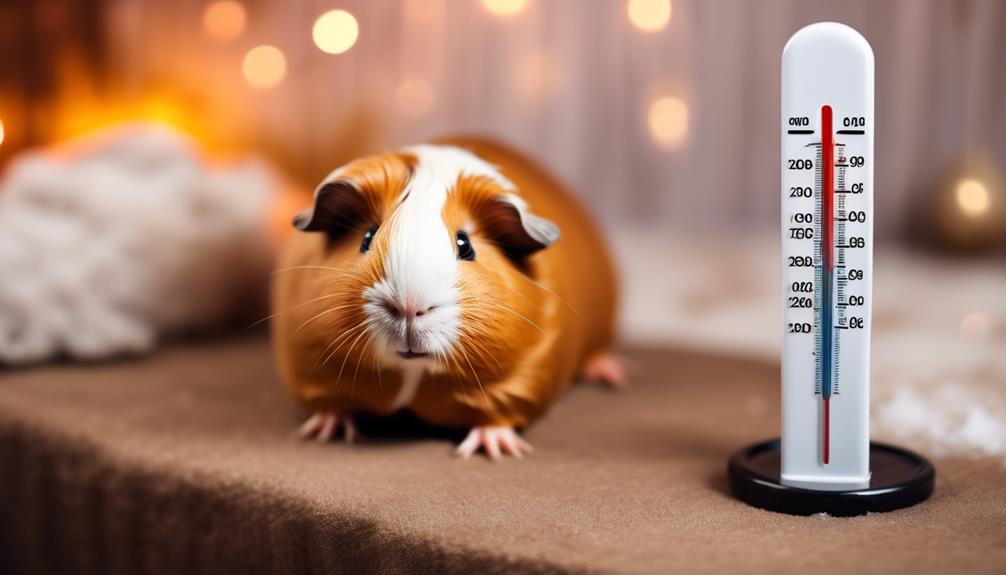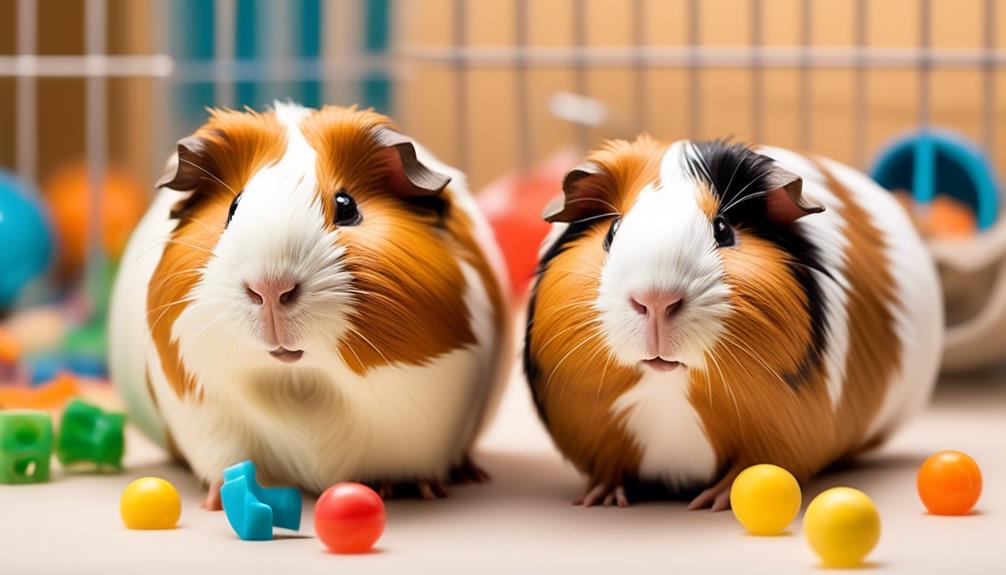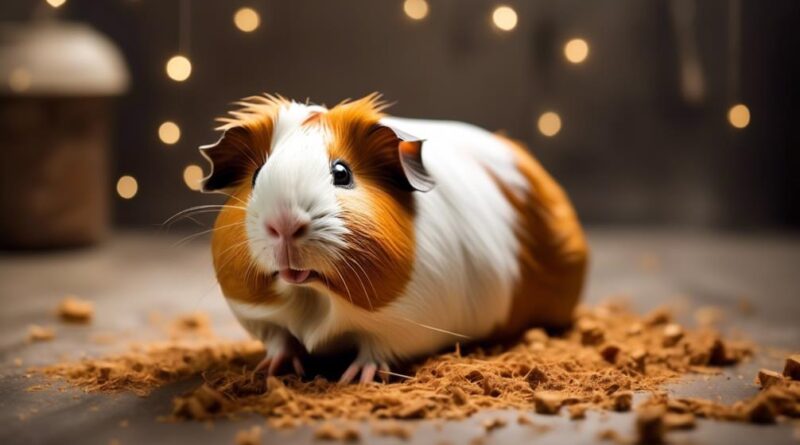Why Does Environment Impact Guinea Pig Lifespan?
Have you ever noticed how a change in environment can affect your mood and overall well-being?
Well, the same goes for your guinea pig. The environment in which a guinea pig lives can have a significant impact on its lifespan and overall health.
From temperature and lighting to cage size and social environment, there are numerous factors that can influence the longevity of your furry friend.
But why exactly does the environment play such a crucial role in the lifespan of a guinea pig?
Let's explore the various elements and their effects on our beloved pets.
Temperature

Maintaining a consistent and comfortable temperature range is crucial for ensuring the optimal health and longevity of your guinea pig. Climate control is essential for your pet's well-being, as guinea pigs are sensitive to extreme temperatures. They thrive in moderate climates, ideally between 65-75°F (18-24°C). It's important to provide a living environment that supports their natural heat regulation processes.
To ensure proper heat regulation, avoid placing your guinea pig's enclosure in direct sunlight or near drafts. Direct exposure to sunlight can cause overheating, while drafts can lead to chilling. Monitoring the temperature within the enclosure is also vital. Use a thermometer to regularly check the ambient temperature and make adjustments as needed. During colder months, consider using a heating pad or lamp designed specifically for small animals to maintain a comfortable environment.
In warmer weather, ensure adequate ventilation to prevent overheating. You can use fans or air conditioning to help regulate the temperature. However, be cautious of placing your guinea pig in areas with high air circulation, as it can lead to drafts. Additionally, providing access to a cool surface, such as ceramic tiles, can help your guinea pig regulate its body temperature.
Humidity
As you monitor the temperature within your guinea pig's enclosure, it's important to also consider the impact of humidity on their well-being and comfort. Humidity refers to the amount of moisture present in the air, and it plays a crucial role in maintaining your guinea pig's health.
Here's why humidity matters:
- Mold Growth: High humidity levels can create a breeding ground for mold and mildew in your guinea pig's living environment. Mold growth poses serious health risks to your pet, potentially causing respiratory issues and allergic reactions. Keeping the humidity at an optimal level will help prevent the growth of mold and ensure a safe living space for your guinea pig.
- Skin Problems: Just like excessively dry air can cause skin issues, high humidity can also lead to skin problems for guinea pigs. When the air is too moist, it can contribute to skin irritations and fungal infections. Maintaining the right humidity level is essential in preventing skin ailments and keeping your guinea pig comfortable and healthy.
- Optimal Comfort: Guinea pigs thrive in environments with moderate humidity levels. Proper humidity ensures that your pet's skin and respiratory system aren't overly dry or damp, leading to overall comfort and well-being.
Lighting
To ensure your guinea pig's well-being, providing adequate lighting in their enclosure is essential for their overall health and behavior. Light exposure plays a crucial role in regulating your guinea pig's circadian rhythm, which affects their sleep-wake cycles, activity levels, and overall mood.
Guinea pigs are naturally diurnal animals, meaning they're most active during the day and require a consistent light-dark cycle to maintain their physiological and behavioral well-being.
Exposure to natural light is ideal for your guinea pig's enclosure. Placing their habitat near a window can provide them with access to natural daylight, which helps regulate their internal body clock. If natural light isn't feasible, artificial lighting can be used to simulate a natural day-night cycle. Ensure that your guinea pig's enclosure receives around 12 hours of light and 12 hours of darkness each day to mimic their natural habitat.
Inadequate lighting can disrupt your guinea pig's circadian rhythm, leading to sleep disturbances and behavioral changes. Insufficient exposure to light may result in lethargy, decreased activity, and irregular sleeping patterns. On the other hand, excessive exposure to light, especially at night, can also negatively impact their circadian rhythm, leading to stress and potential health issues.
Maintaining a consistent light-dark cycle in your guinea pig's environment is crucial for their overall well-being and longevity. By providing appropriate light exposure and respecting their natural circadian rhythm, you can promote a healthy and balanced lifestyle for your beloved pet.
Cage Size
A spacious cage is essential for ensuring your guinea pig's comfort and well-being. When considering the size of the cage for your guinea pig, it's important to take into account their need for exercise space and suitable living conditions.
- Exercise space: Guinea pigs are active animals that require ample space to move around, exercise, and explore. A larger cage allows them to engage in natural behaviors such as running, pop-corning, and playing, which are essential for their physical and mental well-being. Inadequate space can lead to stress and boredom, negatively impacting their overall health.
- Living conditions: A larger cage provides more room for essential items such as hideaways, tunnels, and enrichment toys. This contributes to a stimulating environment that encourages natural behaviors and promotes mental stimulation. Additionally, a spacious cage allows for proper segregation of feeding, resting, and bathroom areas, which can help maintain hygiene and reduce the risk of health issues.
Bedding Material
Considering the impact of environment on your guinea pig's lifespan, the choice of bedding material plays a crucial role in providing them with a comfortable and hygienic living space. When it comes to bedding choices for your guinea pig, there are several options to consider, including paper-based bedding, aspen shavings, fleece liners, and hay. Each bedding material has its own set of health effects on your pet, so it's essential to choose wisely.
Paper-based bedding is a popular choice as it's absorbent and helps control odors. However, some guinea pigs may be sensitive to the dust from paper bedding, which can lead to respiratory issues. Aspen shavings are another common option and are known for their absorbency and odor control. However, they can be dusty as well, potentially causing respiratory problems.
Fleece liners are a reusable and comfortable option for your guinea pig. They're soft on guinea pigs' feet, but it's crucial to regularly clean them to prevent bacterial growth. Hay can also be used as both a bedding material and a food source, providing a natural and comfortable environment for your pet while also aiding in their digestion.
It's important to consider your guinea pig's individual needs and preferences when selecting bedding material to ensure their health and well-being. Regularly cleaning and changing the bedding is also essential to maintain a hygienic living space for your beloved pet.
Air Quality
Ensure that your guinea pig's living space has clean and well-ventilated air to promote their overall health and longevity.
Proper air quality is crucial for your pet's well-being and can be achieved through the following measures:
- Allergen Control: Regularly clean your guinea pig's living area to minimize the accumulation of dust, dander, and other allergens. Use a vacuum with a HEPA filter to effectively remove fine particles that could affect your pet's respiratory system. Additionally, consider using bedding made from low-dust materials to reduce potential allergens in their environment.
- Ventilation Systems: Proper airflow is essential for maintaining clean air in your guinea pig's habitat. Ensure that their enclosure is equipped with adequate ventilation to prevent the buildup of stale or contaminated air. Consider using fans or air purifiers to improve air circulation and filter out impurities. When selecting an air purifier, opt for one with a HEPA filter to effectively capture airborne particles.
- Natural Airflow: Whenever possible, allow for natural airflow by opening windows or placing the enclosure in a well-ventilated area. Fresh air can help dilute indoor pollutants and maintain a healthy environment for your guinea pig.
Social Environment

To foster a healthy social environment for your guinea pig, provide opportunities for interaction and companionship, complementing the beneficial effects of maintaining clean and well-ventilated air in their living space. Social interaction plays a crucial role in the overall well-being of guinea pigs. These animals are highly social and thrive on companionship, making it essential to consider the behavioral impact of their social environment. When guinea pigs have the opportunity to interact with each other, it helps reduce stress and boredom, leading to a happier and healthier life.
Group dynamics within a guinea pig community also play a significant role in their social environment. Guinea pigs establish a dominance hierarchy within their groups, and providing a suitable environment for them to establish and maintain these social structures is essential. This hierarchy can impact their behavior and overall well-being, so it's important to monitor and ensure that the dynamics within the group are healthy and not causing undue stress to any individuals.
When creating a social environment for your guinea pig, it's important to consider their need for companionship and interaction. This can be achieved by housing them with at least one compatible cage mate, providing opportunities for social interaction, and ensuring that the group dynamics are harmonious. By doing so, you'll contribute to a positive social environment that promotes the overall well-being and longevity of your guinea pig.
Stress Factors
When assessing stress factors in guinea pigs, carefully observe their behavior and physical responses to environmental stimuli. Stress can significantly impact the lifespan of guinea pigs, so it's crucial to address potential stressors in their environment.
Here are some key stress factors to consider:
- Diet Quality and Exercise: A poor diet and lack of exercise can lead to stress in guinea pigs. Ensure that they've access to high-quality hay, fresh vegetables, and a balanced guinea pig pellet diet. Additionally, providing opportunities for exercise, such as a spacious cage with enrichment activities, can help reduce stress levels.
- Handling Frequency and Noise Levels: Guinea pigs are sensitive to excessive handling and loud noises. While they enjoy interaction, frequent or rough handling can cause stress. Similarly, loud or sudden noises can startle them and lead to prolonged stress. It's important to handle them gently and minimize exposure to loud environments.
- Environmental Changes: Any sudden changes in their environment, such as relocation of their cage or alterations in their surroundings, can induce stress. Try to maintain a consistent environment and introduce changes gradually to minimize stress.
Frequently Asked Questions
Can Guinea Pigs Live Longer if They Are Kept in a Natural Outdoor Environment?
Living outdoors in a natural environment can positively impact a guinea pig's lifespan. They benefit from natural sunlight, fresh air, and more space to roam, which can contribute to their overall health and well-being.
In contrast, indoor living in an artificial environment may not provide the same level of stimulation and enrichment. Therefore, the outdoor environment can potentially support a longer and healthier life for guinea pigs.
How Does the Surrounding Environment Affect a Guinea Pig's Mental Health and Overall Well-Being?
In a guinea pig's environment, mental stimulation and social interaction play crucial roles.
A stimulating environment with toys, tunnels, and obstacles can keep your guinea pig mentally engaged and prevent boredom.
Social interaction is equally important, as guinea pigs are social creatures and benefit from companionship.
A lack of mental stimulation and social interaction can lead to stress and behavioral issues, affecting your guinea pig's mental health and overall well-being.
Are There Specific Plants or Natural Elements That Can Improve a Guinea Pig's Lifespan in Their Environment?
Incorporating specific plants and natural elements into your guinea pig's environment can mimic their natural habitat, providing nutritional benefits and supporting an outdoor lifestyle. This can positively impact their lifespan by promoting physical activity, mental stimulation, and social interaction.
Consider introducing grass, dandelion greens, and herbs like mint and parsley. These elements can enrich their surroundings, contributing to a healthier and longer life for your guinea pig.
Can the Presence of Other Animals or Pets in the Household Impact a Guinea Pig's Lifespan?
Interacting with other pets in your household can impact a guinea pig's lifespan. The dynamics between different animals can cause stress or conflicts, affecting your guinea pig's health and longevity.
It's important to carefully manage their interactions with other pets to ensure a safe and harmonious environment. Providing a peaceful and stress-free living space for your guinea pig can positively influence their overall well-being and potentially extend their lifespan.
How Does Noise Pollution or Excessive Sound in the Environment Affect a Guinea Pig's Lifespan?
Excessive noise in your environment can seriously impact your guinea pig's lifespan. The constant sound can lead to stress, affecting their overall health.
Incorporating stress management techniques, such as providing quiet spaces and calming music, can help mitigate the impact of urbanization on your pet.
Creating a peaceful environment will contribute to a healthier and longer life for your guinea pig.
Conclusion
In conclusion, the environment plays a crucial role in determining the lifespan of guinea pigs. Factors such as temperature, humidity, lighting, and cage size all impact their overall health and well-being. Bedding material, air quality, social environment, and stress also play important roles in their longevity.
By providing a comfortable and suitable environment for your guinea pig, you can help ensure a longer and healthier life for your furry friend. So, make sure to pay attention to their surroundings and provide the best care possible for them.
